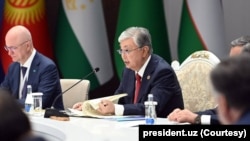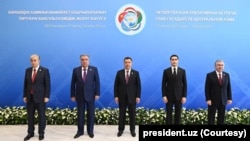The leaders of Central Asia’s five nations edged toward closer cooperation but remain well short of the integrated community that has been a goal in the region for decades. Analysts say the five must still build trust while balancing ties with Russia and China.
Uzbek President Shavkat Mirziyoyev stressed the positive at the July 21 summit in Cholpon-Ata, Kyrgyzstan, claiming that regional dialogue has created a constructive environment for multidimensional cooperation.
“We have removed many barriers to the free flow of goods and people,” he said. “We have active cultural and tourism exchanges now. This is allowing us to expand trade and investment” in the region of more than 77 million people, the majority under age 45.
Mirziyoyev and the presidents of Kazakhstan, Kyrgyzstan, Tajikistan and Turkmenistan emphasized progress made on economic ties and connectivity, climate and green energy, tourism, water sharing and hydropower investments.
While publicly silent on Russia’s war in Ukraine and recent civil protests that turned violent in Kazakhstan, Tajikistan and Uzbekistan, the leaders also agreed to forge a network of security and intelligence services. Observers note that the governments tend to blame bloodshed on “foreign elements.”
Tajik President Emomali Rahmon, whose government worries about possible sleeper cells in Afghanistan, said the five nations must work together against “threats of terrorism, extremism, drugs and arms trafficking, cybercrime and other forms of cross-border organized crime.”
Turkmenistan’s new leader, Serdar Berdimuhamedov, struck a similar note, saying, “In the context of the extreme aggravation of the world situation, we need to preserve unity and solidarity.”
Like his colleagues, he pledged closer partnership on transport, communications and water resources.
Kazakhstan President Kassym-Jomart Tokayev maintained that Central Asia has yet to unleash its transport and logistical potential. He said his government is committed to developing a Trans-Caspian corridor stretching from China and Kazakhstan across the Caspian Sea to Azerbaijan, Georgia, Turkey and parts of Eastern Europe.
He said Kazakhstan is also ready to participate in the construction of a railroad from Peshawar in northwestern Pakistan through Kabul to Mazar-e-Sharif in northern Afghanistan.
“We call on our partners to actively use the Kazakhstan-Turkmenistan-Iran railroad, the shortest route between East Asia and the Persian Gulf,” he said.
Kyrgyz President Sadyr Japarov admitted his country still must solve border disputes with Uzbekistan and Tajikistan.
“I want to confirm that we have a strong will to complete these negotiations on mutual agreements,” he said, promising to create “transnational bridges of peace, friendship, and trust.”
Japarov urged his fellow leaders to sign a proposed pact on friendship, good neighborly relations and cooperation. “I hope this treaty will serve as the reliable basis for common prosperity in Central Asia.”
But Turkmenistan and Tajikistan are not yet on board and say they still are reviewing the document.
Central Asia experts suspect that the two nations’ authoritarian leaders are reluctant to be bolder, compared to the more confident Kazakh, Uzbek and Kyrgyz presidents. Turkmenistan’s closed economy imposes barriers to cooperation.
“Still, this should still be a starting point,” said Temur Umarov, a fellow at the Carnegie Endowment for International Peace. “Three out of five countries sealing oral promises with some sort of a document is movement in the right direction.”
Umarov said increasing discourse about closer cooperation reflects dynamism.
“Political leaders are interested at least in thinking together about what the region’s future might look like. It was not like that several years ago.”
Tashkent-based scholar Farkhad Tolipov said the leaders “see the need for stronger collaboration now, and this should lead to homegrown institutional frameworks.” As of now, he asserted, the region leans into Russia- and China-led blocs.
Umarov sees Uzbekistan and Kazakhstan as the region’s closest partners, “which is a good thing as it would be much easier to add other countries to the existing strong partnership initiatives between the two biggest economies of Central Asia.”
Annual consultations among the five leaders are “a huge leap forward,” he added. “This is not only a great opportunity to meet exclusively without any foreign actor but to create connections.”
Marlene Laruelle, director of the Central Asia program at the George Washington University, agrees.
“We see trends toward more regional cooperation, but it is cooperation, not integration,” she told VOA. “A bloc is not realistic yet. There is still too much mutual distrust.”
She said the obstacles include differences in policy approaches and the lack of bottom-up momentum to integrate.
Tokayev suggested that representatives from Russia and China might be included in future regional summits, but Umarov pointed out that these powers already have other venues for dialogue with the region.
“This should be done without damaging the safe space where Central Asian states can have an open discussion about anything, including their policies towards China and Russia,” she said.
Uzbek analyst Anvar Nazir sees dependence on Moscow and Beijing as another obstacle to closer integration.
“As long as leaders fear and lean on these powers, Central Asia will not become an independent region,” he said.
Several Tajik experts told VOA they still see the Kremlin’s deep impact on the political mentality.
“Central Asia is a ground for geopolitical games, and with each state facing enormous political and economic challenges, there is more room for Russia and China, while the West remains passive,” analyst Ilhom Yusupov said.
But American policymakers see Central Asia countries finally acting in their own interest.
Assistant Secretary of State for South and Central Asia Donald Lu recently told VOA that the region is now setting the agenda for the C5+1 dialogue with Washington.
“This is exactly what we hoped would happen: Central Asian countries have their own voice now,” Lu said. “That really demonstrates that these are sovereign countries with their own interests and agenda. Central Asian states show great leadership in telling us what they want from this relationship.”
This story originated in VOA's Uzbek Service
"asian" - Google News
July 27, 2022 at 07:14AM
https://ift.tt/wBXZ6uf
Central Asian States Talk Cooperation but Integration Remains a Dream - Voice of America - VOA News
"asian" - Google News
https://ift.tt/luCQpP5
Shoes Man Tutorial
Pos News Update
Meme Update
Korean Entertainment News
Japan News Update



No comments:
Post a Comment